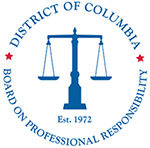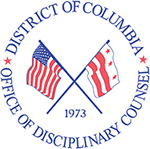- For the Public
- For Lawyers
- Board on Professional Responsibility
- Office of Disciplinary Counsel
- Disciplinary Decisions
-
Attorney Discipline News
- Administrative Order 2020-8: Live Streams of Hearing Committee Proceedings
- Administrative Order 2023-1: Return to In-Person Proceedings
- The Court of Appeals Makes Appointments to the Board on Professional Responsibility
- Amendments to the Rules of the Board on Professional Responsibility
- Amendments to the Rules of the Board on Professional Responsibility
- Volunteer Opportunities
From Washington Lawyer, June 2015
By Gene Shipp
One of my assistant bar counsel asked me a great but troubling question the other day. I had just reached 10 years as the head of our office, and he asked what the current Gene would say to the Gene of 10 years ago. I had what we call in our office a “period of reflection” and gave him an answer that he found sobering and somber. We will get to my answer later. His question caused me to reflect upon what the phrase period of reflection means to me.
I recall a D.C. Superior Court judge back in the 1970s asking me why a Criminal Justice Act Voucher for Court Appointed Lawyers did not have a section to add time to the voucher for thinking. The first time I heard the phrase period of reflection was from then-Bar Counsel Fred Grabowsky in 1980. I was trying cases as a new assistant bar counsel and we were chatting about what sanction to recommend. Fred said that the attorney in question needed a period of reflection before he resumed practice. Fred was never so worried about the difference between a six- and nine-month suspension. He figured that any time to reflect on what happened and why it happened would be enough to ensure the discipline system would never see the attorney again. In most cases this has proven to be true.
I recently wrote a column titled “Change Is the Only Constant,” which appeared in the April 2015 issue of Washington Lawyer. Change seems to consume us so much that time for reflection is almost a lost art form. We have e-mails to answer, social media to check, clients and co-workers who need instant answers, and a family who is growing up so fast and in ways we never dreamed about. I wonder if the demands of our lives are cutting into our time for reflection?
What has this to do with discipline? I have concluded over the years that our ethical responsibility and our disciplinary rules require periods of reflection. Instant decisions based upon immediate situations and client demands are sometimes poorly made. If you have an uneasy, nagging feeling or a concern that your parents would not be proud, a period of reflection is well advised because you may be about to have an ethics problem.
We have seen cases where attorneys, upon reflection, have corrected a representation to a court, their client, their opposing party, and third parties. This recognition weighs well in the Office of Bar Counsel’s evaluation of attorney conduct and our view of the attorney’s ethical radar. The respondent (an attorney enduring our investigation into his or her conduct) who attracts our attention is the one who lacks insight into the rules, their applications, and his or her duty to the courts/clients. The respondent who appears in a favorable light is the one who, after a period of reflection, explains what happened and why it will not happen again.
As I get older, I really appreciate more than ever the time to reflect. I now have the opportunity for reflection on the weekends at my folk’s farm maintaining gardens, mowing acres of grass, and doing the list required of a son. I also have time to reflect when I read the wonderful comments of Jake Stein at the back of this magazine, which permits me to travel back in time.
Now to the answer about what the 10 years older and wiser Gene would say to Gene who was taking over the office after 23 years as deputy. I would have told myself that despite all the really hard work and complex litigation, delays in investigations would continue to be a concern. We have triaged cases over the last 10 years to address those few attorneys who represented the greatest threat to the public, we worked the very old cases in the office but have not cleared every case, and we have doubled the number of cases we are taking to hearings. All of that said, we still have cases that have been held under investigation too long. Now that I have reflected, it is time to work with the resources we have in place to clear all old cases. The question was a good one and one that caused a period of reflection. I hope this article gives you an opportunity for a period of reflection.
Gene Shipp serves as bar counsel for the District of Columbia.
Disciplinary Actions Taken by the Board on Professional Responsibility
Original Matters
In re Ernest P. Francis. Bar No. 439894. March 17, 2015. The Board on Professional Responsibility recommends that the D.C. Court of Appeals suspend Francis for 30 days and that the suspension be stayed in favor of a six-month period of unsupervised probation, during which time the respondent must complete three hours of continuing legal education covering legal ethics. While hired to serve as local counsel for an attorney representing a client in a civil matter in the United States District Court for the District of Columbia, Francis violated Rule 1.3(b)(1) (intentional failure to seek the lawful objectives of a client); Rule 1.3(b)(2) (intentional prejudice or damage to a client); Rule 1.4(a) (failure to keep client reasonably informed); and Rule 1.4(b) (failure to explain matters to permit client to make informed decisions). Francis intentionally did not seek an extension of time to respond to a motion to dismiss his client’s case after having been asked to do so by his lead counsel, which resulted in the dismissal of the client’s case.
Disciplinary Actions Taken by the District of Columbia Court of Appeals
Original Matters
In re James W. Beane Jr. Bar No. 444920. March 10, 2015. The D.C. Court of Appeals revoked Beane’s reinstatement to practice law and suspended him with reinstatement subject to a showing of fitness.
In re Thomas Fortune Fay. Bar No. 23929. March 19, 2015. The D.C. Court of Appeals directed Fay be informally admonished. The court agreed, with the Board on Professional Responsibility’s approval, of the Hearing Committee’s finding of the existence of an attorney–client relationship where Fay was engaged by a suspended lawyer to file a civil complaint on behalf of the suspended lawyer’s client. After filing the complaint, as the counsel of record, Fay failed to provide his client with skill and care commensurate with that generally afforded clients by other lawyers in similar matters; failed to represent the client zealously and diligently, including failing to attend to the client’s case with reasonable promptness; failed to keep client reasonably informed about the status of the case; failed to explain status of client’s case to permit client to make informed decisions regarding the representation; and failed to provide client with a writing setting forth the basis of rate or fee, as proscribed by the rule in place in 1999. 1.1(b), 1.3, 1.4(a), 1.4(b), and 1.5(b).
In re Theodore S. Silva Jr. Bar No. 412894. March 5, 2015. The D.C. Court of Appeals reinstated Silva to the D.C. Bar, with conditions.
In re Sherri L. Wyatt. Bar No. 390314. March 12, 2015. The D.C. Court of Appeals suspended Wyatt for six months for negligently misappropriating funds. She engaged in other misconduct as well. 1.1(b), 1.4(a), 1.4(b), 1.15(a), and D.C. Bar R. XI § 19(f).
The Office of Bar Counsel compiled the foregoing summaries of disciplinary actions.
Informal Admonitions issued by Bar Counsel and Reports and Recommendations
issued by the Board on Professional Responsibility are posted at
www.dcattorneydiscipline.org. Most board recommendations as to discipline are
not final until considered by the court. Court opinions are printed in the Atlantic Reporter and also are available online for decisions issued since August 1998. To obtain
a copy of a recent slip opinion, visit www.dccourts.gov/internet/opinionlocator.jsf.
- For the Public
- For Lawyers
- Board on Professional Responsibility
- Office of Disciplinary Counsel
- Disciplinary Decisions
-
Attorney Discipline News
- Administrative Order 2020-8: Live Streams of Hearing Committee Proceedings
- Administrative Order 2023-1: Return to In-Person Proceedings
- The Court of Appeals Makes Appointments to the Board on Professional Responsibility
- Amendments to the Rules of the Board on Professional Responsibility
- Amendments to the Rules of the Board on Professional Responsibility
- Volunteer Opportunities

- Board on Professional Responsibility
- 430 E Street NW
- Suite 138
- Washington, DC 20001
- Phone: 202-638-4290
- Fax:

- Office of Disciplinary Counsel
- District of Columbia Court of Appeals
- 515 5th Street, NW
- Building A, Suite 117, Washington, DC 20001
- Phone: 202-638-1501
- Fax: 202-638-0862

